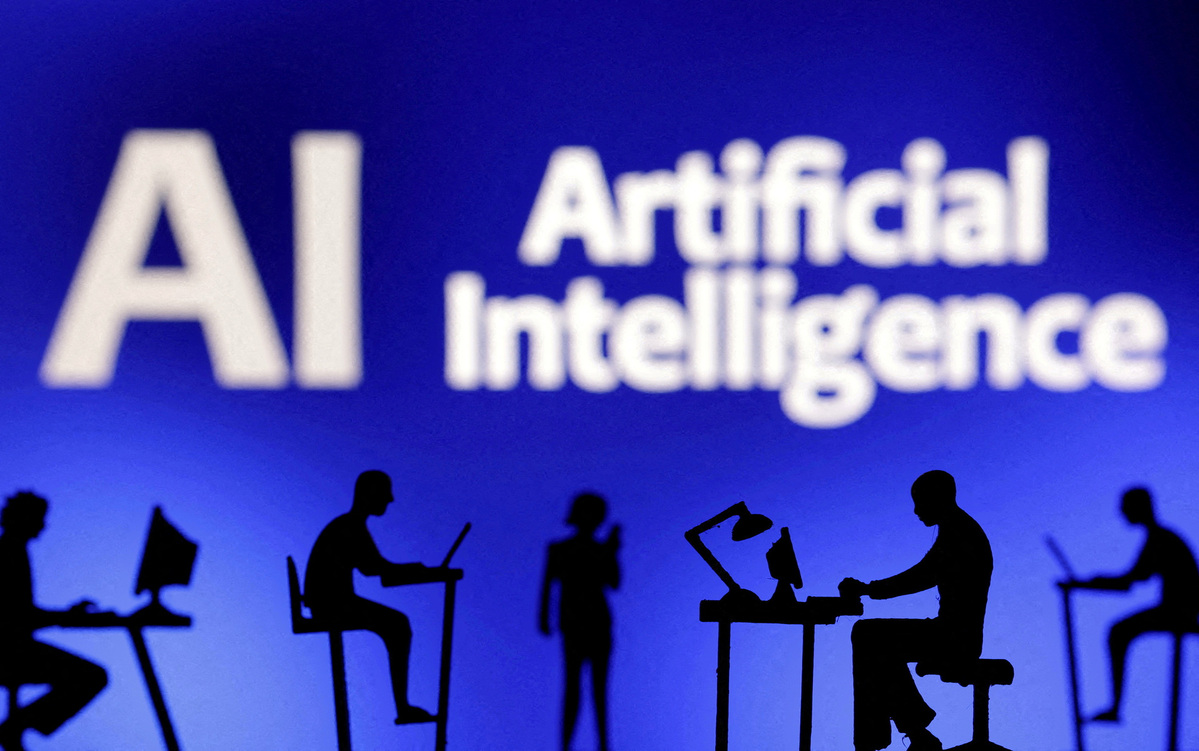
Figurines with computers and smartphones are seen in front of the words "Artificial Intelligence AI" in this illustration taken, Feb 19, 2024. [Photo/Agencies]
Experts have called for a clearer boundary for the application of artificial intelligence technology amid heated debates sparked by the misuse of AI-generated content for publicity stunts and commercial gains.
A recent online article on the mortality rate of those born in the 1980s triggered public uproar, only to be later dismissed as AI fabrication.
The article, purportedly based on data from the seventh national census conducted in 2020, claimed that the mortality rate among people born in the 1980s exceeded 5.2 percent by the end of 2024, which means one in every 20 individuals born in that decade has passed away. However, it was soon revealed that the article is deeply inaccurate.
Li Ting, a professor at Renmin University of China's School of Population and Health, told China Central Television that the assertion likely originated from an interaction with AI, which might have confused the definitions of "cumulative mortality rate" and "annual mortality rate".
"Mortality rates are usually very low, typically in the range of a few per thousand, and cannot be as high as 5 percent. The statement that 'one in every 20 individuals born in the 1980s has passed away' refers to the cumulative mortality rate," she said.
Coincidentally, generative AI has been used to clone the voices and faces of many celebrities for both entertainment purposes and profits.
For example, the voice of Lei Jun, founder, chairman and CEO of Chinese tech giant Xiaomi Corp, was replicated using AI and used for voice-overs to criticize traffic congestion or busy workdays in sharp or even vulgar language.
Zhang Wenhong, an expert in epidemic management and public health, was also impersonated in AI-generated promotional videos to sell protein bars.
Using AI technology to produce and release deepfake audios or videos constitutes infringement and should be held accountable by law, experts said.
Lyu Yanhui, a member of the computer security professional committee of the China Computer Society, was quoted by CCTV as saying that China's Civil Code stipulates that people have rights to their faces and voices, and any organization or individual using information technology to forge them commits an infringement.
Tu Lingbo, a professor at Communication University of China, whose research focuses on media theory and internet governance, said the influx of uncensored or unlabeled content generated by AI could have a disruptive impact on the internet ecosystem and pose challenges to internet governance.
"The spread of misinformation has been persistently affecting the media industry," he said.
Zhao Jingwu, an associate professor at the Law School of Beihang University, told CCTV that the law does not prohibit the use of AI synthesis technologies, but rather prohibits its illegal and unreasonable use, especially the release and dissemination of AI-synthesized information without identification and warning.
AI-generated content needs to be further regulated and users should know where the boundary is, experts said.
"Relevant laws and regulations governing the application and communication of AI-generated content on public platforms should be enhanced, while content creators must improve their AI literacy to utilize the technology responsibly," said Tu, the professor.
Contact the writers at xunuo@chinadaily.com.cn